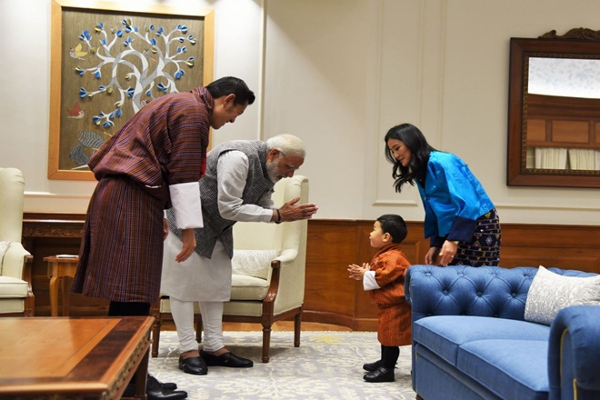Prime Minister Narendra Modi will visit Bhutan on 17-18 August to underline his government’s emphasis on India’s “neighbourhood first” policy, as well as the country’s special relationship with the strategically located Himalayan nation, two people familiar with the developments said on Monday.
Modi’s trip will be his first to Bhutan since the China-India military face-off in 2017, triggered by an intrusion by Chinese troops into territory claimed by Bhutan. In recent years, China has been trying to woo Bhutan, seeking to open an embassy in the country, which has diplomatic missions from India, Bangladesh and Kuwait.
India and Bhutan are to sign four to five memoranda of understanding during Modi’s visit and some major announcements are expected, according to a report in a local newspaper Kuensel, which quoted Bhutan’s prime minister Lotay Tshering.
Bhutan was the first country Modi visited after taking office in 2014, a reflection of the priority accorded to it by New Delhi. After winning the 2019 elections, Modi invited leaders of the Bay of Bengal Initiative for Multi-Sectoral Technical and Economic Cooperation, a South and Southeast Asian economic grouping, for his swearing in on 30 May. Tshering was one of those who attended the event in New Delhi. Modi’s visit comes within three months of his taking office for the second term.
Foreign minister S. Jaishankar visited Bhutan on his first trip abroad after assuming office in June, while foreign secretary Vijay Gokhale visited Thimphu earlier this month to pave the way for Modi’s visit. Modi is expected to focus on assistance for Bhutan’s economic development and cooperation in hydropower.
Recent reports have pointed at Bhutan looking at a change in its economic relationship with India and moving from aid to investments.
India and Bhutan have enjoyed a “special” relationship, according to analysts. “India and Bhutan have closely aligned their foreign policy on many occasions,” said Smruti Pattnayak, an analyst with the government-backed Institute of Defence Studies and Analyses, pointing to the common position both countries have taken with regard to China’s ambitious Belt and Road Initiative.
The two countries have also taken a common position vis a vis terrorism, Pattnayak said, referring to Bhutan joining India in pulling out of the 2016 South Asian Association for Regional Cooperation Summit, which was to be hosted by Pakistan, following a string of terrorist attacks in India.
The two sides have agreed to “cooperate closely with each other on issues relating to their national interests”, in line with the 2007 India-Bhutan Friendship Treaty.
According to the treaty, “neither government shall allow the use of its territory for activities harmful to the national security and interest of the other.”
Under a previous pact, India was to “guide” Bhutan on foreign and defence policies. The language of the 2007 treaty was clearly a departure from this, and primarily aimed at respecting the sensitivities of Bhutan regarding its sovereignty.
Analysts said that in reality India’s military plays a key role in protecting Bhutan from external threats posed by the Chinese military. The Indian Army’s Eastern Command and the Indian Air Force’s Eastern Command are tasked with the responsibility. As part of this understanding, Indian troops in 2017 objected to Chinese troops attempting to build a road at Bhutan’s Doklam plateau. The Chinese troops refused to stop road construction, leading to the 73-day long standoff, one of the most tense situations to bedevil India-China relations in recent decades. No country should do anything near the Doklam tri-junction point between India, China and Bhutan “unilaterally”, Tshering said in an interview to the Hindu newspaper in June. As long as status quo is maintained, “there will be peace and tranquility in the region”, he was quoted as saying. The comments were in line with the views of India and Bhutan on the military standoff, Pattnayak said, despite calls from certain quarters for a relook at the ties between India and China to balance relations between Bhutan’s two giant neighbours. Soon after this election, Tshering chose to visit India first, which was seen as a reflection of Bhutan’s desire to maintain close ties with New Delhi.
Source: LM
Image Courtesy: FE
You may also like
-
IAF Aircraft Set Course For Exercise Eastern Bridge VII At Oman
-
India-us Working Together In Areas Like Critical Minerals, Supply Chains And Advanced Technologies: Shri Piyush Goyal
-
Defence Secretary to co-chair 5th India-Philippines Joint Defence Cooperation Committee meeting in Manila
-
2nd India-Japan Finance Dialogue held in Tokyo on 6th September, 2024
-
Prime Minister, Shri Narendra Modi welcomes Crown Prince of Abu Dhabi
